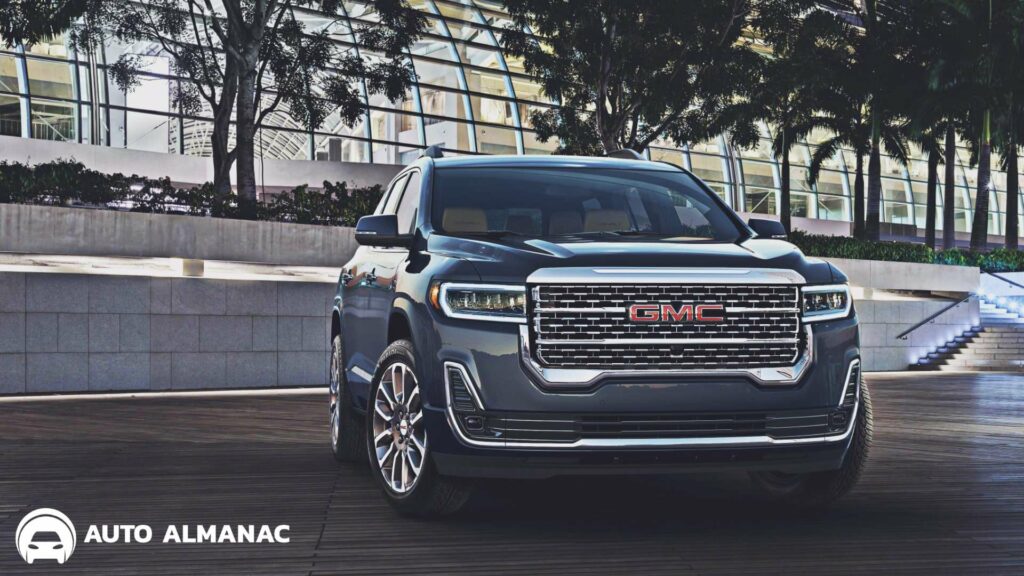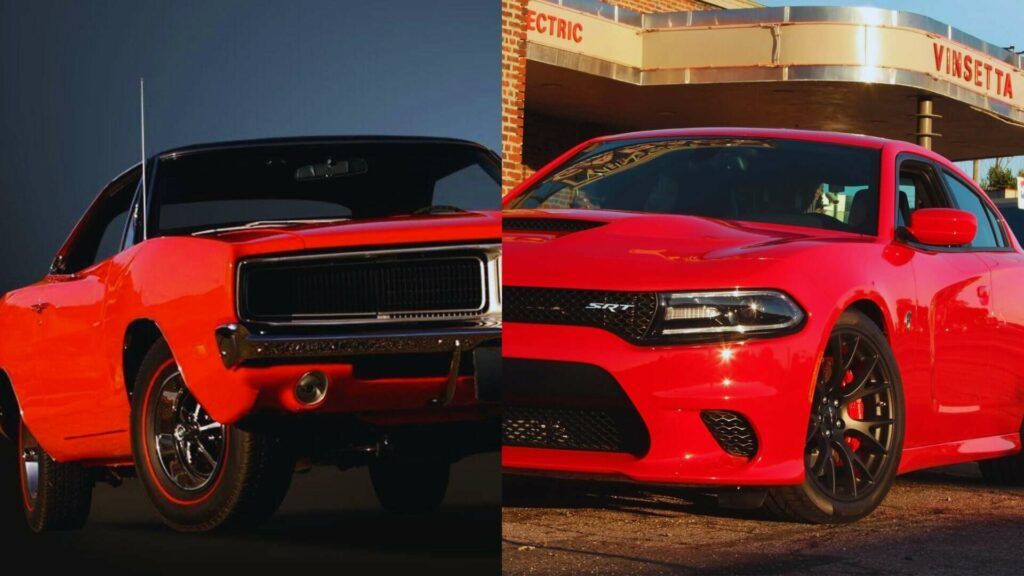
The GMC Acadia is undoubtedly a luxurious beast in its own right every time we take one out for a spin, considering it wasn’t exactly meant to tackle terrain as rugged as its design features suggest.
Sure, you can definitely take it off-road as much as you can take anything that has wheels to the track, but the point is the Acadia can only perform as well as the fuel you feed it with, regardless of what surface you’re on.
So with all our experiences in keeping this sophisticated animal well-fed, we present to you all of the types of gas that the GMC Acadia can and cannot take!
What type of gas does a GMC Acadia take?
The GMC Acadia can take regular unleaded 87-octane gasoline and gasoline blended with up to 10% (2011 and older) or 15% (2012 and newer) ethanol content.
However, the manufacturer recommends using mid-grade 89-octane gasoline when towing with 3.6L V6 models from 2007 to 2008.
Regardless of the GMC Acadia model or generation that you have, the crossover SUV takes a minimum of unleaded 87-octane gasoline for all of its engine options.
87 is pretty much the same minimum octane rating for the Acadia’s other cousins that were made under the same GM Lambda platform, such as the Chevrolet Traverse (2018 chevy traverse gas type) and Buick Enclave crossover SUVs.
But apart from the minimum fuel requirement of “regular” 87-octane fuel, the GMC Acadia also has certain types of fuel that are either recommended or at least compatible depending on the specific model that we’re talking about.
For instance, the earliest 1st-gen GMC Acadia models made between 2007 and 2008 are equipped with 3.6-liter “LY7” V6 engines that are actually recommended to be filled up with mid-grade 89-octane gas when used for towing or other heavy-duty tasks.
Since tasks like towing demand more from the engine, the 2 extra points that 89-octane has over 87-octane allow the 2007 to 2008 GMC Acadia to be more protected against potential engine knock when under heavier load.
As for other Acadia model years, they don’t really have any specific fuel recommendations stated in their manuals when used for towing, so it’s best to stick to the usual 87-octane minimum.
Other than the octane rating, it’s also worth talking about specific compatible (and incompatible) fuel blends for the GMC Acadia, and we’ll be doing so further below. Read on!
GMC Acadia Fuel Requirements by Generation and Engine Option
1st-gen GMC Acadia models need a minimum of 87-octane gasoline. However, mid-grade 89-octane gasoline is recommended for 2007 to 2008 models when using them for towing or other heavy-duty tasks.
2nd-gen GMC Acadia models need a minimum of 87-octane gasoline for all engine options.
1st-Generation GMC Acadia (2007 to 2016)
| Engine Option | Minimum Fuel Requirement |
| 3.6L LY7 V6(2007 to 2008) | • 87-Octane Gasoline (Regular) • (89-Octane Recommended for Towing) • (E-10-Capable Until 2008) |
| 3.6L LLT V6(2009 to 2016) | • 87-Octane Gasoline (Regular) • (E-10 Capable from 2009 to 2011) |
| 3.6L LLT V6(2009 to 2016) | • 87-Octane Gasoline (Regular) • (E-15-Capable from 2012 to 2016) |
The 1st-generation GMC Acadia was unveiled back in 2006 for the 2007 model year as a full-size crossover vehicle, and it only came with a single V6 power plant option under its hood.
Sporting a 3.6-liter “LY7” V6, the 1st-gen Acadia was rated at 275 hp at the crank, but only if fed with at least 87-octane gasoline.
Any gasoline lower than 87-octane will, of course, reduce the performance of the GMC Acadia much like any other vehicle. You’ll also likely experience engine knocking with lower-octane fuels.
Furthermore, the 2007 to 2008 owner’s manual states that it’s recommended to switch to mid-grade 89-octane gasoline if you were to use the vehicle for towing or any similar heavy-duty task.
For the 2009 model year, the “LY7” V6 was replaced by the “LLT” V6 which also had 3.6 liters of displacement. The minimum octane requirement still remains at 87, but the 89-octane recommendation when doing heavy-duty tasks was otherwise removed.
It’s also worth mentioning that when the 1st-gen Acadia was released, it was already compatible with gasoline containing ethanol.
However, ethanol content in the gasoline used should only be limited up to 10% (E-10) for 2011 and older models and up to 15% (E-15) for 2012 and newer models.
2nd-Generation GMC Acadia (2017 to 2023/Present)
| Engine Option | Minimum Fuel Requirement |
| 2.0L LSY Inline-4 (I4) Turbo(2020 Onwards) | 87-Octane Gasoline (Regular) |
| 2.5L LCV Inline-4 (I4)(2017 to 2021) | 87-Octane Gasoline (Regular) |
| 3.6L LGX V6 | 87-Octane Gasoline (Regular) |
After a decade of the 1st-gen GMC Acadia roaming the streets, the 2nd-gen model was unveiled for the 2017 model year, and with it came a total of three different engine options for its trim levels.
Now in the form of a mid-size crossover SUV, the 2nd-gen Acadia was initially released with either a 2.5-liter “LCV” 4-cylinder engine or a newer 3.6-liter V6 engine with the code “LGX”.
Both the 2.5-liter I4 and the 3.6-liter V6 engines are capable of taking regular gasoline with a minimum octane rating of 87, and no other octane rating has been specified in the owner’s manual for them.
Even with the inclusion of the newer turbocharged 2-liter “LSY” I4 engine in 2020, the minimum fuel requirement still remained at regular 87-octane gas, which means no unnecessary spending on premium fuel for owners.
As with the previous generation, the 2nd-gen GMC Acadia is also capable of taking gasoline blended with ethanol no matter which engine you go for.
Since the EPA has already allowed up to 15% ethanol for all vehicles made after 2011, all 2nd-gen Acadia models are also capable of taking E-15 fuel (15% ethanol, 85% gasoline).
Types of Gasoline/Fuel That Can Be Used in a GMC Acadia
The GMC Acadia can be filled up with TOP TIER detergent gasoline, gasoline with compatible additives (e.g. ACDelco fuel treatment), reformulated gasoline, and up to 10% or 15% ethanol blends (E-10/E-15).
TOP TIER Detergent Gasoline
TOP TIER detergent gasoline is one of the most popular and recommended types of fuel for the majority of today’s vehicles, which includes the GMC Acadia.
The GMC Acadia owner’s manual recommends filling up the SUV with TOP TIER gasoline to benefit from its safe and effective engine-cleaning detergent additives.
TOP TIER gasoline is formulated with a higher concentration of detergent additives than most fuels, resulting in better prevention of carbon deposit buildup inside your engine.
Of course, with less carbon buildup present, you’ll be getting a cleaner engine that can perform optimally every time you push the gas pedal.
Due to its popularity, TOP TIER detergent gasoline is currently being sold by over 60 fuel brands in North America. To spot one at your local pump, be sure to look for its unique green label, as illustrated below.
Gasoline With Compatible Additives
Just in case you can’t really find any gas station nearby that sells TOP TIER detergent gasoline, you can still get similar benefits by using additives that are actually compatible with your vehicle.
Since the GMC Acadia is, after all, built by General Motors (GM), the manufacturer recommends using ACDelco Fuel System Treatment Plus, which is a fuel additive that cleans your entire fuel system and helps maintain engine performance.
According to the owner’s manual, GM recommends pouring one bottle of ACDelco Fuel System Treatment Plus after you’ve just had your oil changed. Alternatively, you can also use it every 9,000 miles of driving.
After adding the fuel additive, your engine will also be cleaned of any debris or carbon deposits as it would have when you’ve used TOP TIER fuel.
Reformulated Gasoline (RFG) (1st-Gen Models)
Another alternative and more modern type of fuel that’s compatible with the GMC Acadia is reformulated gasoline, which is primarily made to be cleaner-burning compared to conventional gasoline.
| • However, it’s important to mention that the recommendation of reformulated gasoline (RFG) is only stated in the GMC Acadia’s manual until the 2016 model year, while all manuals after that year do not mention RFG at all. • Thus, we suggest using RFG only for 1st-gen models and sticking to other fuel types for 2nd-gen models for now until the manufacturer updates its info on compatible fuels. |
Over 30% of all gasoline currently in circulation in the US is reformulated gasoline, and they are specifically formulated with less toxic ingredients to avoid further contributing to the formation of ozone and other air toxins in the atmosphere.
Due to its environmental benefits, not only is reformulated gasoline recommended by the manufacturer for the GMC Acadia, but it’s also mandated in a lot of metropolitan areas where air pollution or smog is at its worst.
Since it can be tricky to tell the difference between typical gasoline and RFG due to the lack of a label, be sure to ask local retailers at the pump if the gasoline that they sell is actually reformulated.
Up to 10% or 15% Ethanol Blends (E-10/E-15)
From the get-go, the GMC Acadia’s fuel system has been compatible with gasoline containing ethanol up to a certain point.
Ethanol is a type of oxygenate or alcohol that’s blended with gasoline for the purpose of renewability, cleaner emissions, and boosting the octane number of pure gasoline for more anti-knock protection.
| However, the GMC Acadia, in particular, can only take up to 10% ethanol content (E-10) for 2011 and older models and up to 15% ethanol content (E-15) for 2012 and newer models. This is stated in the owner’s manuals of the respective model years. |
Thus, any type of fuel that contains over 15% ethanol by volume should be avoided for the GMC Acadia, as too much ethanol can corrode and damage vital components of the engine and fuel system.
Since the GMC Acadia can only take up to 15% ethanol at most, it’s considered a non-Flex-Fuel vehicle (non-FFV). Thus, it’ll come with a regular black gas cap as opposed to the yellow one that FFVs have.
Types of Gasoline/Fuel to Avoid for the GMC Acadia
Avoid filling up the GMC Acadia with gasoline containing MMT, E-85/Flex-Fuel, fuel with over 15% ethanol, methanol, diesel/biodiesel fuel, or any fuel with a lower octane rating than 87.
Gasoline Containing MMT (Methylcyclopentadienyl Manganese Tricarbonyl)
If there’s ever one type of additive that you should definitely avoid adding to your gasoline, it would be MMT.
Many major automakers advise against using MMT for any of their vehicle models due to its numerous downsides, and that includes GMC with the Acadia.
MMT has been used to raise the octane rating of gasoline for several decades, but it also comes with known drawbacks including premature fouling of the spark plugs and damage to other emission system components.
Furthermore, MMT has already raised numerous health concerns in the past, as it also makes your vehicle’s emissions more toxic to the environment.
Because of its negative effects, MMT has either been banned for use in gasoline in most places, while places that do still use it are strictly limited to an amount of 1/32 gpg Mn, or the grams of MMT present in a gallon of manganese.
E-85/Flex-Fuel or Any Fuel With Over 15% Ethanol
E-85 or “Flex-Fuel” is a specific type of ethanol fuel blend that can contain as much as 85% ethanol, though it’s not compatible for use with the GMC Acadia’s fuel system.
As we’ve discussed earlier, the GMC Acadia can only take gasoline with up to 15% of ethanol at most, so using anything higher, especially E-85, can likely cause damage and corrosion to numerous components of the engine and fuel system.
When we say damage to “components”, this doesn’t just include ones made of metal, but also those made of rubber and plastic such as fuel lines.
Flex-Fuel vehicles (FFV) are equipped with special yellow fuel caps with “E-85” printed on them to distinguish them from non-FFVs like the GMC Acadia, which only has a regular black gas cap.
Methanol and Other Incompatible Materials
There are other incompatible fuel materials that you should also avoid for the GMC Acadia, such as methanol, methylal, ferrocene, and aniline.
According to the GMC Acadia owner’s manual, using fuel containing any traces of methanol, methylal, ferrocene, or aniline can also damage and corrode engine and fuel system components.
Thus, using such materials is very similar to using too much ethanol than what your vehicle is capable of taking.
Diesel/Biodiesel Fuel
The GMC Acadia was never released in diesel form, which obviously means that you should not touch any sort of diesel or biodiesel fuel with a ten-foot pole.
Accidentally putting diesel fuel in a gasoline car can clog the fuel injectors and eventually cause the engine to seize when not remedied right away. This is because diesel fuel is naturally thicker and denser than gasoline (petrol).
Just in case you do make the mistake of putting diesel in a gas car, do not attempt to drive it any further. Instead, have your car towed to the nearest mechanic where it can be properly drained and repaired.
What will happen if I use the wrong type of gas in my car?
Using the wrong type of gas, such as using fuel with a lower octane rating than what’s required for your vehicle, can result in knocking noises in the engine, decreased performance, and potential damage to engine components.
GMC Acadia Gas Mileage Per Generation
The 1st-gen GMC Acadia has a combined gas mileage of 18 to 19 mpg for 3.6L V6 FWD models and 17 to 19 mpg for 3.6L V6 AWD models.
The 2nd-gen GMC Acadia has a combined gas mileage of 23 to 25 mpg for 2.0L I4 turbo models, 22 to 23 mpg for 2.5L I4 models, and 17 to 22 mpg for 3.6L V6 models.
1st-Generation GMC Acadia Gas Mileage (2007 to 2016)
| Engine Option | MPG (City) | MPG (Highway) | MPG (Combined) |
| 3.6L V6 (FWD) | 15 to 17 mpg | 22 to 24 mpg | 18 to 19 mpg |
| 3.6L V6 (AWD) | 15 to 16 mpg | 22 to 23 mpg | 17 to 19 mpg |
2nd-Generation GMC Acadia Gas Mileage (2017 to 2023/Present)
| Engine Option | MPG (City) | MPG (Highway) | MPG (Combined) |
| 2.0L Inline-4 (I4) Turbo (FWD) | 21 to 22 mpg | 28 to 29 mpg | 24 to 25 mpg |
| 2.0L Inline-4 (I4) Turbo (AWD) | 21 to 22 mpg | 27 to 28 mpg | 23 to 24 mpg |
| 2.5L Inline-4 (I4) (FWD) | 21 mpg | 26 to 27 mpg | 23 mpg |
| 2.5L Inline-4 (I4) (AWD) | 21 mpg | 25 mpg | 22 to 23 mpg |
| 3.6L V6 (FWD) | 18 to 19 mpg | 25 to 27 mpg | 21 to 22 mpg |
| 3.6L V6 (AWD) | 17 to 19 mpg | 25 to 26 mpg | 20 to 21 mpg |
| 3.6L V6 (FWD)(Acadia Limited) | 15 mpg | 22 mpg | 18 mpg |
| 3.6L V6 (AWD)(Acadia Limited) | 15 mpg | 22 mpg | 17 mpg |
GMC Acadia Gas Tank Size/Capacity Per Generation
The GMC Acadia’s gas tank size/capacity is 22 gallons (83.3 liters) for 1st-generation models and 19 to 22 gallons (71.9 to 83.3 liters) for 2nd-generation models.
| GMC AcadiaGeneration/Model Years | Engine/Trim Level | Gas Tank Size/Capacity(US Gallon/Liter) |
1st Generation(2007 to 2016) | 3.6L V6 (SL)(2010 to 2012) | 22 gal (83.3 l) |
| 3.6L V6(SL AWD)(2010 to 2012) | 22 gal (83.3 l) | |
| 3.6L V6 (SLE/SLE-1) | 22 gal (83.3 l) | |
| 3.6L V6(SLE/SLE-1 AWD) | 22 gal (83.3 l) | |
| 3.6L V6 (SLE-2)(2013 Onwards) | 22 gal (83.3 l) | |
| 3.6L V6(SLE-2 AWD)(2013 Onwards) | 22 gal (83.3 l) | |
| 3.6L V6 (SLT-1) | 22 gal (83.3 l) | |
| 3.6L V6(SLT-1 AWD) | 22 gal (83.3 l) | |
| 3.6L V6 (SLT-2) | 22 gal (83.3 l) | |
| 3.6L V6(SLT-2 AWD) | 22 gal (83.3 l) | |
| 3.6L V6 (Denali)(2011 Onwards) | 22 gal (83.3 l) | |
| 3.6L V6(Denali AWD)(2011 Onwards) | 22 gal (83.3 l) | |
2nd Generation(2017 to 2023/Present) | 2.5L I4 (SL) | 19 gal (71.9 l) |
| 2.5L I4 (SLE-1) | 19 gal (71.9 l) | |
| 2.5L I4 (SLE-1 AWD) | 22 gal (83.3 l) | |
| 2.5L I4 (SLE-2) | 19 gal (71.9 l) | |
| 2.5L I4(SLE-2 AWD) | 22 gal (83.3 l) | |
| 2.5L I4 (SLT-1) | 19 gal (71.9 l) | |
| 3.6L V6(SLT-1 AWD) | 22 gal (83.3 l) | |
| 3.6L V6 (SLT-2) | 19 gal (71.9 l) | |
| 3.6L V6(SLT-2 AWD) | 22 gal (83.3 l) | |
| 3.6L V6 (Denali) | 19 gal (71.9 l) | |
| 3.6L V6 (Denali AWD) | 22 gal (83.3 l) | |
| 2.0L I4 Turbo (SLE)(2023/Present) | 19.4 gal (73.4 l) | |
| 2.0L I4 Turbo(SLE AWD)(2020 to 2021) | 22 gal (83.3 l) | |
| 2.0L I4 Turbo(SLE AWD)(2022 to 2023/Present) | 21.7 gal (82.1 l) | |
| 2.0L I4 Turbo (SLT)(2020 to 2022) | 19 gal (71.9 l) | |
| 2.0L I4 Turbo (SLT)(2023/Present) | 19.4 gal (73.4 l) | |
| 2.0L I4 Turbo(SLT AWD)(2020 to 2021) | 22 gal (83.3 l) | |
| 2.0L I4 turbo(SLT AWD)(2022 to 2023/Present) | 21.7 gal (82.1 l) | |
| 3.6L V6(AT4 AWD)(2020 to 2021) | 22 gal (83.3 l) | |
| 3.6L V6(AT4 AWD)(2022 to 2023/Present) | 21.7 gal (82.1 l) | |
| 3.6L V6 (Denali)(2023) | 19.4 gal (73.4 l) | |
| 3.6L V6(Denali AWD)(2022 to 2023/Present) | 21.7 gal (82.1 l) |




